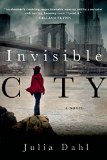Summary | Excerpt | Reviews | Beyond the book | Read-Alikes | Genres & Themes | Author Bio

If The Debba were a building it might be an M.C. Escher-like structure with staircases doubling back onto themselves creating an awesome network of levels and plotlines. On the surface this may appear to be a murder mystery, but from page one it became clear to me that it was much more than I was expecting. There is so much captivatingly, grippingly more here.
While the murder mystery/amateur detective plot stands as the cornerstone of the story, like a mirage on a blistering Tel Aviv highway it shimmers in and out of view. At times it is supplanted by the story of a man, David Starkman, who is at once haunted by and hoping to make sense of his own life by blindly following his deceased father's last wishes. At other times the focus turns to the return of this prodigal son of Israel to the country he renounced when he gave up his citizenship and became a Canadian citizen. Concomitantly the storyline deals with the rocky relationship between David and his father. Then, of course, there is the play, "The Debba," and the challenges of producing it during Israel's tumultuous 1977 pre-election season, which thrums in the background providing an edgy undercurrent.
Mandelman does a masterful job of illustrating the mind-boggling complexity of life in Israel. While David hunts for clues to his father's brutal murder there are no clear-cut good guys or bad guys. There are cops and there are suspects but who is who remains as elusive as smoke. There are Arabs and there are Jews. Further, there are Ashkenazi Jews and Mizrahi Jews who each originated in different parts of the world and are thus disinclined to trust each other - though they trust each other more than either trusts the Arabs. And the impending election for the Knesset (Israel's parliament) is ratcheting up the whole country's stress level. Got it so far?
Toss into the mix a generation of Jews who immigrated to Israel in 1946 and who all lost loved ones when they "went to Hitler." Add David, who served in a top-secret squad in the Six Day War who lost a brother to war. David who was so burned out by his wartime experiences that he was willing to leave the only family, home and life he had ever known, simply walking away, never looking back - except for the nightmares. Once he left Israel he had no wish to become involved in Israel or in his father's life. "Somehow I knew if I recognized [my father's] claim on me… I could never again cut myself loose and would end up going back… to the dreck and the blood." Yet he does return, planning to quickly wrap up his father's affairs and hop a plane back to Canada.
It was not to be. The odds are against him. There is just too much deception - behind his father's murder, his father's life, the play and his father's friends. No one is telling the truth, or at least the whole truth. And David is helpless to avoid being sucked into the intrigue of what he calls, "this goddamned country." Until, in the end, as somebody once said, "the play's the thing."
I will tell no more. The Debba is a fine book for readers who, like me, have basically only broad-brush knowledge of Middle East politics, have few preconceptions about said politics and who relish ingeniously multi-layered stories.
![]() This review
first ran in the September 8, 2010
issue of BookBrowse Recommends.
This review
first ran in the September 8, 2010
issue of BookBrowse Recommends.

If you liked The Debba, try these:

by Julia Dahl
Published 2015
In her riveting debut Invisible City, journalist Julia Dahl introduces a compelling new character in search of the truth about a murder and an understanding of her own heritage.

by David J. Halperin
Published 2011
A sparkling debut novel set in the sixties about a boy's emotional and fantastical journey through alien worlds and family pain.
Your guide toexceptional books
BookBrowse seeks out and recommends the best in contemporary fiction and nonfiction—books that not only engage and entertain but also deepen our understanding of ourselves and the world around us.